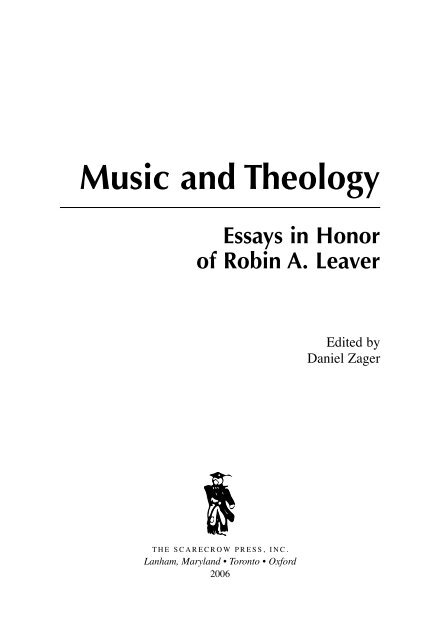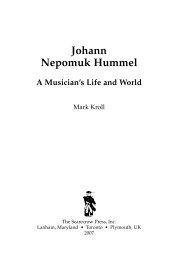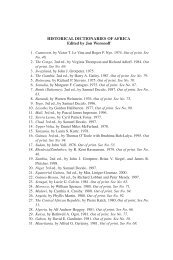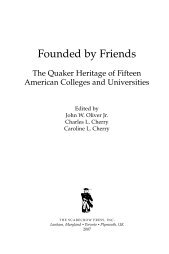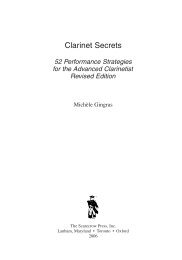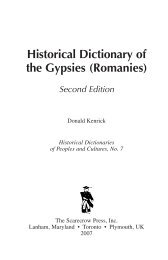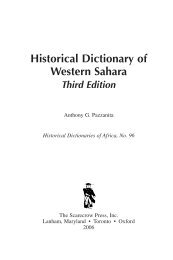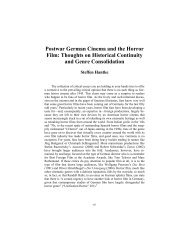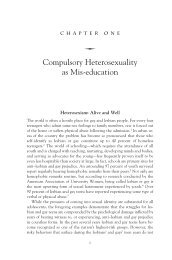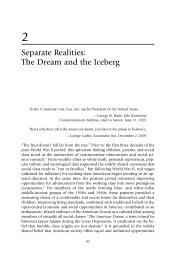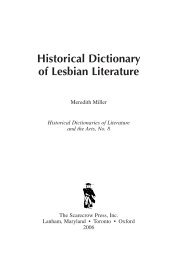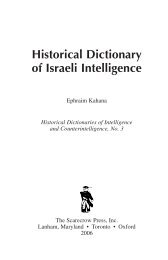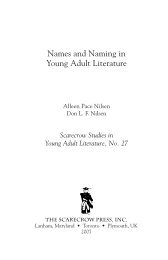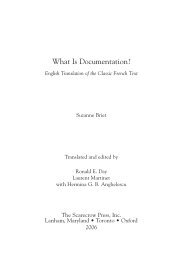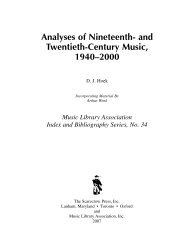Music and Theology - Scarecrow Press
Music and Theology - Scarecrow Press
Music and Theology - Scarecrow Press
Create successful ePaper yourself
Turn your PDF publications into a flip-book with our unique Google optimized e-Paper software.
<strong>Music</strong> <strong>and</strong> <strong>Theology</strong><br />
Essays in Honor<br />
of Robin A. Leaver<br />
THE SCARECROW PRESS, INC.<br />
Lanham, Maryl<strong>and</strong> • Toronto • Oxford<br />
2006<br />
Edited by<br />
Daniel Zager
Preface v<br />
1 “The Soul Is Symphonic”: Meditation on Luke 15:25<br />
<strong>and</strong> Hildegard of Bingen’s Letter 23 1<br />
William T. Flynn<br />
2 Early Lutheran Hymnals <strong>and</strong> Other <strong>Music</strong>al Sources in the<br />
Kessler Reformation Collection at Emory University 9<br />
Stephen A. Crist<br />
3 Tradition with Variations: Chorale Settings per omnes versus<br />
by Buxtehude <strong>and</strong> Bach 31<br />
Kerala J. Snyder<br />
4 Bach’s Preluding for a Leipzig Academic Ceremony 51<br />
Gregory Butler<br />
5 Bach’s Setting of the Hymn Tune “Nun komm, der Heiden<br />
Heil<strong>and</strong>” in His Cantatas <strong>and</strong> Organ Works 69<br />
Anne Leahy<br />
6 Historically Informed Rendering of the Librettos from<br />
Bach’s Church Cantatas 103<br />
Michael Marissen<br />
iii<br />
Contents
iv Contents<br />
7 The Role of the “Actus Structure” in the Libretto of<br />
J. S. Bach’s Matthew Passion 121<br />
Don O. Franklin<br />
8 Two Unusual Cues in J. S. Bach’s Performing Parts 141<br />
Daniel R. Melamed<br />
9 Johann Sebastian Bach <strong>and</strong> the Praise of God: Some<br />
Thoughts on the Canon Triplex (BWV 1076) 147<br />
Albert Clement<br />
10 Bach <strong>and</strong> Dresden: A New Hypothesis on the Origin of<br />
the Goldberg Variations (BWV 988) 169<br />
Yo Tomita<br />
11 A Is for Apple: The Search for an American Church <strong>Music</strong>;<br />
or The ABCs of American Church <strong>Music</strong>: A Is for Apple,<br />
B Is for Billings, <strong>and</strong> C Is for Chapman 193<br />
Steve Pilkington<br />
12 Beauty <strong>and</strong> Terror: What Have We to Sing; What Has<br />
Worship to Pray? 213<br />
D. E. Saliers<br />
13 Robin A. Leaver: A Bibliography of His Writings 229<br />
Sherry L. Vellucci<br />
Index 000<br />
About the Contributors 000
<strong>Music</strong> <strong>and</strong> theology: in his scholarly work <strong>and</strong> in his teaching Robin A.<br />
Leaver has spent much of his life bringing these two disciplines together. His<br />
work as a musicologist consistently places sacred music in its various liturgical<br />
contexts, thereby enriching our underst<strong>and</strong>ing of why these repertories<br />
were created, how they functioned, <strong>and</strong> what they signified to those who listened.<br />
As a theologian, Robin has written cogently about music as theology—<br />
about church music playing its part in theological proclamation. Thus, he<br />
brings to the study of sacred music repertories, <strong>and</strong> indeed to the practice of<br />
church music, a connection to theology that grounds this music in its larger<br />
contexts.<br />
Robin was trained in theology at Trinity College, Bristol, graduating in<br />
1964 <strong>and</strong> being ordained into the ministry of the Church of Engl<strong>and</strong> in the<br />
same year. He served various parishes in Engl<strong>and</strong> for the next twenty years.<br />
By 1971 he was publishing articles <strong>and</strong> reviews on a wide variety of music<br />
<strong>and</strong> church historical topics, <strong>and</strong> in that same year, supported by a Winston<br />
Churchill Fellowship, he was able to travel to the United States in order to investigate<br />
Johann Sebastian Bach’s own copy of the Abraham Calov Deutsche<br />
Bibel, held by the library of Concordia Seminary, St. Louis. This work would<br />
lead eventually to Robin’s 1983 monograph Bachs theologische Bibliothek<br />
(Neuhausen-Stuttgart: Hänssler-Verlag), a foundational work in theological<br />
Bach studies. But Robin’s first monograph was a theological treatise published<br />
eight years earlier, Luther on Justification (St. Louis: Concordia Publishing<br />
House, 1975). Thus, relatively early in his career Robin had begun his<br />
work on Luther <strong>and</strong> on Bach, topics that continue to absorb his scholarly attention<br />
today (with a major monograph, Luther’s Liturgical <strong>Music</strong>: Principles<br />
v<br />
Preface
vi Preface<br />
<strong>and</strong> Implications, forthcoming in 2006). Luther, of course, was a brilliant theologian<br />
but also an informed musician, a person who loved music <strong>and</strong> considered<br />
it a gift of God. Similarly, Bach, the extraordinary composer <strong>and</strong> consummate<br />
Lutheran cantor, who went to considerable effort <strong>and</strong> expense to<br />
build a personal library of Orthodox Lutheran theological writings, was well<br />
informed as a theologian, his musical work being shaped in part by his underst<strong>and</strong>ing<br />
of Lutheran theology. It is, of course, no coincidence that<br />
Robin—theologian <strong>and</strong> musician—has devoted much of his scholarly energy<br />
to investigating the work of these two towering figures, who were themselves<br />
each immersed in theology <strong>and</strong> music.<br />
In 1977 Robin was appointed to a position at Latimer House, Oxford, in<br />
which he was expected to “research, write, lecture, <strong>and</strong> publish in the crossdisciplinary<br />
areas of theology, liturgy, hymnology, <strong>and</strong> church music.” A<br />
glance at the chronological list of his writings in this volume reveals that he<br />
has been doing precisely that ever since. Ten years later—in 1987—he earned<br />
the doctorate in theology at the Rijksuniversiteit Groningen, the Netherl<strong>and</strong>s.<br />
His dissertation, “‘Goostly Psalmes <strong>and</strong> Spirituall Songes’: English <strong>and</strong><br />
Dutch Metrical Psalms from Coverdale to Utenhove 1535–1566” was subsequently<br />
revised for publication as a monograph by Clarendon <strong>Press</strong> (1991), a<br />
work that illustrates yet another strain of Robin’s work—the history of<br />
psalmody <strong>and</strong> hymnody, including that of his native country.<br />
As a teacher of church music at Westminster Choir College (since 1984),<br />
as a faculty member of the Liturgical Studies program of the Graduate School<br />
of Drew University, <strong>and</strong> as a member of the graduate faculty at The Juilliard<br />
School, Robin has trained numerous church musicians <strong>and</strong> liturgical scholars,<br />
providing them a rich background in theology, liturgy, hymnology, <strong>and</strong> the<br />
history <strong>and</strong> practice of church music. He has also served as president of two<br />
organizations that, each in their own way, focus on music <strong>and</strong> theology—the<br />
Internationale Arbeitsgemeinschaft für Hymnologie <strong>and</strong> the American Bach<br />
Society. Robin has invested considerable time in founding <strong>and</strong> editing three<br />
monographic series devoted to theology, liturgy, <strong>and</strong> music: Studies in Liturgical<br />
<strong>Music</strong>ology, Drew Studies in Liturgy, <strong>and</strong> Contextual Bach Studies (all<br />
three series published by <strong>Scarecrow</strong> <strong>Press</strong>). While some of these monographs<br />
relate to Robin’s teaching in the Liturgical Studies program at Drew University,<br />
others come from his knowledge of research in progress <strong>and</strong> his encouragement<br />
of scholars who share his love for the study of music <strong>and</strong> theology.<br />
Characteristic of Robin is his generosity in sharing his time <strong>and</strong> in providing<br />
encouragement <strong>and</strong> sound advice to other scholars. I think it safe to say<br />
that everyone connected with this volume has benefited at one time or another<br />
from Robin’s scholarly assistance <strong>and</strong> encouragement, <strong>and</strong> that we all relish
Preface vii<br />
those conversations with Robin that invariably clarify a line of inquiry, confirm<br />
a hypothesis, or provide fresh insights into a particular problem. Robin<br />
is a cherished colleague, <strong>and</strong> it is a privilege to present this volume to him—<br />
with thanks, <strong>and</strong> with every good wish for more productive years as a teacher,<br />
mentor, editor, <strong>and</strong> scholar of music <strong>and</strong> theology.


